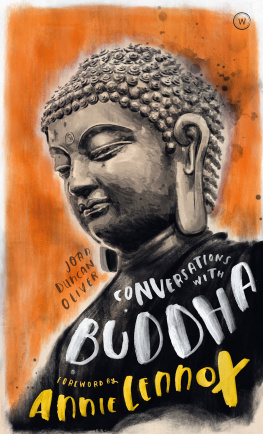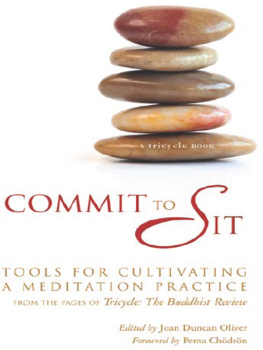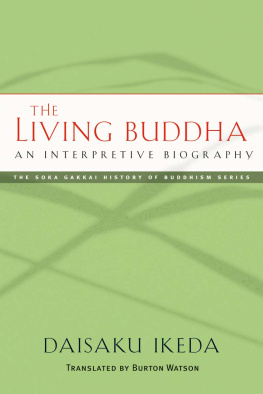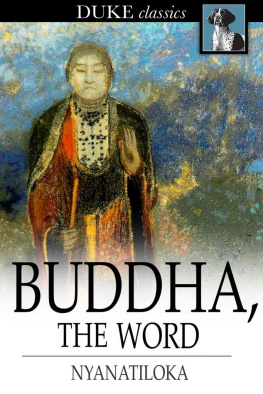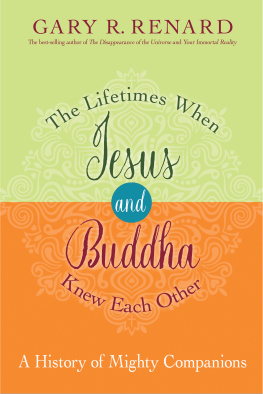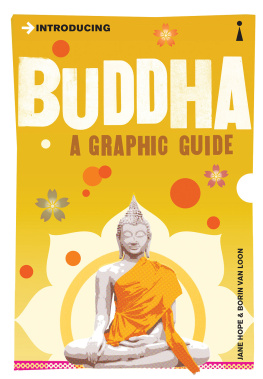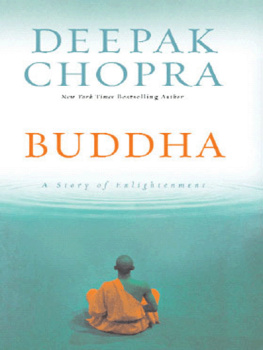
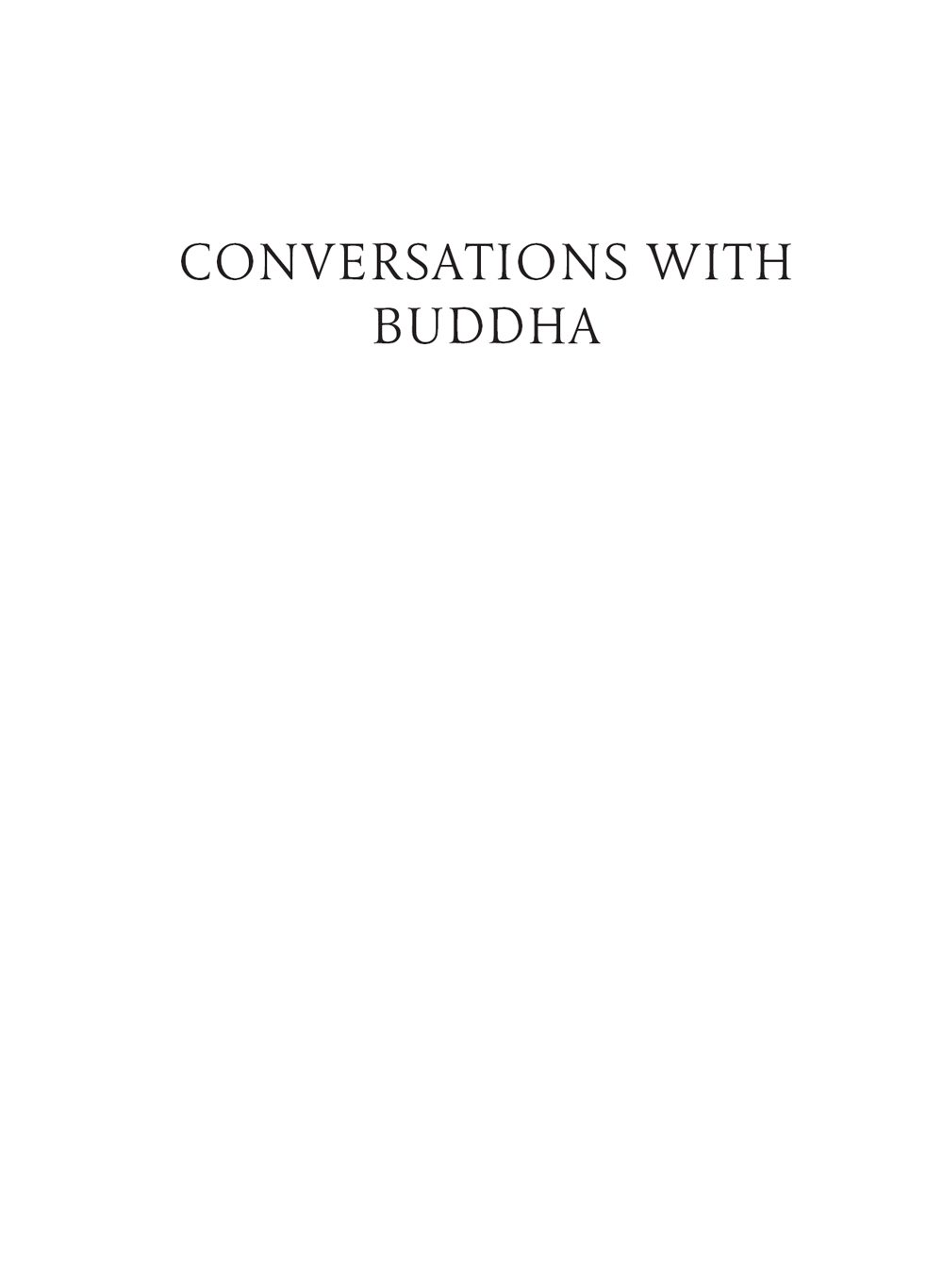

Originally published under the title The Buddha...Off the Record 2007
This edition first published in the UK and USA 2019 by
Watkins, an imprint of Watkins Media Limited
Unit 11, Shepperton House
8993 Shepperton Road
London
N1 3DF
Design and typography copyright Watkins Media Limited 2019
Text copyright Joan Duncan Oliver 2007, 2019
Foreword copyright Annie Lennox 2007, 2019
Joan Duncan Oliver has asserted her right under the Copyright, Designs and Patents Act 1988 to be identified as the author of this work.
All rights reserved.
No part of this book may be reproduced or utilized in any form or by any means, electronic or mechanical, without prior permission in writing from the Publishers.
10 9 8 7 6 5 4 3 2 1
Typeset by JCS Publishing Services Ltd
Printed and bound by TJ International Ltd, Padstow, Cornwall
A CIP record for this book is available from the British Library
ISBN: 978-1-78678-247-2
www.watkinspublishing.com
Publishers note:
The interviews in this book are purely fictional, while being based on Buddhist texts. They take place between a fictionalized Buddha and an imaginary interviewer.
Joan Duncan Oliver has written on spirituality and well-being for many publications, including Health, Self, New Age Journal, O: The Oprah Magazine, Tricycle and The New York Times. Her previous books include Contemplative Living (2000), Happiness (DBP, 2005) and Good Karma (DBP, 2006). She lives in New York City.
Annie Lennox is a singer/songwriter, performer, activist and mother.
Learn about key figures in science, spirituality, art and literature through revealing dialogues based on established fact. Written by a fantastic collection of authors and foreword writers gathered together to delve into the lives and achievements of some of the worlds greatest historical figures, this series is perfect for anyone looking for a quick and accessible introduction to the subject.
OTHER TITLES IN THE SERIES
Published
Conversations with JFK by Michael O'Brien; Foreword by Gore Vidal
Conversations with Oscar Wilde by Merlin Holland; Foreword by Simon Callow
Conversations with Casanova by Derek Parker; Foreword by Dita Von Teese
Forthcoming
Conversations with Dickens by Paul Schlicke; Foreword by Peter Ackroyd
Conversations with Galileo by William Shea; Foreword by Dava Sobel
CONTENTS
FOREWORD BY ANNIE LENNOX
My first significant encounter with Buddhism was vivid and unforgettable. Years ago when I was a student in London, a friend took me to see a group of Tibetan monks chanting and playing traditional ceremonial instruments. I was fascinated by the cacophonous sounds of clashing cymbals juxtaposed against high-pitched wind instruments (like oboes gone mad), all underscored by a backwash of primordial sound. To top it all, the monks were wearing a fabulous combination of medieval-style maroon robes, set off with yellow pointed headgear. I felt Id encountered something ancient and mystical, even though I had little clue as to the ritualistic meaning of what was going on.
Ive always been drawn to otherness. The idea of a Buddhist monk or nun sitting for hours in seated meditation has always intrigued me. At first my response was, Why on earth would anyone want to do that? Later on I think I began to understand it a little better.
I wasnt brought up in any particular religion or spiritual tradition, and I believe this was an advantage in a certain way. I have always felt free to explore possibilities, without being too much encumbered by those terrible burdens of dogmatically informed fear and guilt that have so badly affected many people.
Eastern literature attracted me. I came across the poems of the Chinese poet Lao Tzu in meta-physical bookstores. I looked at Zen texts too the koans and haiku. I wondered if by any chance I might discover the meaning of existence through the combination of words laid out succinctly but obscurely before me.
Over the years Ive chosen much of my reading material from the great Buddhist communicators people like His Holiness the Dalai Lama, Chgyam Trungpa Rinpoche and Pema Chdrn, among many others. I like to think of myself as being open to wisdom wherever I find it, rather than attaching myself to a particular group or sect although Ive had a few close encounters along the way. Im wary of the cult of personality surrounding many teachers and gurus; on the other hand, I recognize that a charismatic teacher is, for many, an essential part of their development.
We can all aspire to embracing peace and love, but in this world of temporary and unpredictable existence what we often engender instead is a state of constant fearfulness. No matter how we direct our energies, we cant escape suffering in one form or another. Our desires bring no contentment, even when theyre fulfilled. Buddhism can offer ways of dealing with all this compassion being the fundamental key.
When things get dark, and hard to handle, Buddhist philosophy can be inspirational with a simple reminder to breathe, to go easy on the day, moment by moment, to be mindful if we can. As Pema Chdrn so succinctly put it, Buddhism offers us the option of learning how to be comfortable with the notion of insecurity.

INTRODUCTION
We know him as the Buddha, the Awakened One, one of the worlds greatest spiritual leaders. He wasnt a god but an ordinary mortal born Siddhartha Gautama 2,500 years ago in northern India. His humanity speaks to us today. He suffered as we do, then by his own efforts found the key to liberation from the bonds of desire, hatred and ignorance. As Westerners living in relative prosperity, we can identify with this man who had it all love, success, money, talent, privilege but set it aside to search for something deeper and more enduring.
How did he do it? What did he learn? If the Buddha were here now, how might he explain the truths he uncovered? Sit down with these pages and for the next hour or so, the Buddhas wisdom is yours for the asking.
THE BUDDHA
(c.563c.483BC)
HIS LIFE IN SHORT
The earth trembles. Lions and tigers, serpents and scorpions grow tame. Diseases fall away from the sick. Humans shower one another with kindness. Such marvels herald a wondrous event: the birth of Siddhartha Gautama, who became the spiritual teacher known as the Buddha.
Legend has it that Mahamaya, Siddharthas mother, was forewarned she would give birth to a mahapurusha, a great man. In a dream, she was transported by heavenly spirits to a plateau high in the Himalayas, where a magnificent white elephant pierced her side with its tusk and entered her womb. The dream, interpreted by Brahmin priests, prepared her for the arrival of a hero.
The child was born not in the city of Kapilavastu, where Mahamaya lived with her husband, Suddhodana, ruler of the Sakya clan, but in a grove of trees in the park at nearby Lumbini. Choosing the noblest tree, Mahamaya grasped a branch for support and gave birth painlessly, standing up. It is said that the newborn sprang to his feet, took seven strides, and surveying the four directions, cried: I am born for enlightenment for the good of the world. Her sacred task complete, Mahamaya died within the week. The childs care fell to her sister, Mahapajapati, Suddhodanas second wife.
Next page
